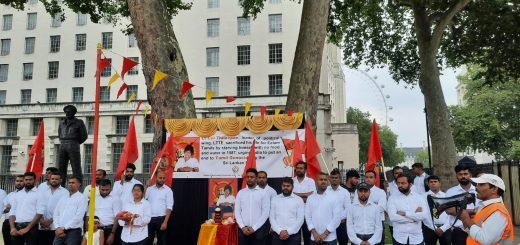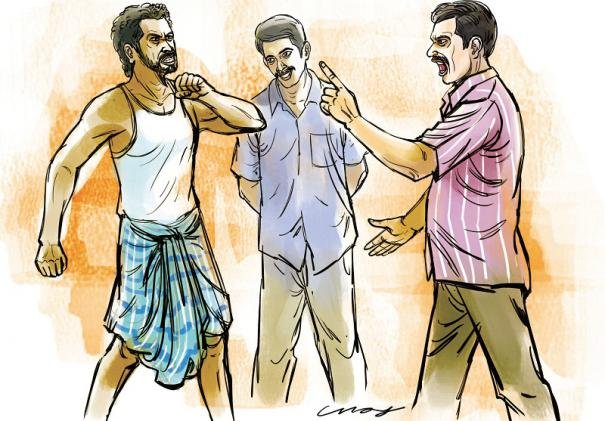Show vs Reality-GTF – compromise and wrong strategies
‘Reverse lobby’
Any organisation that claims to represent the Tamil-speaking people should be accountable to them. The interests of the oppressed people should be the highest priority. And that should be taken into consideration when working out any perspective or strategy.
The Global Tamil Forum, known as GTF, however, now stands accused of what some activists are calling ‘reverse lobbying’: of lobbying Tamils in the interests of governments, instead of putting pressure on governments in the interests of Tamils. As proof of this, GTF has now organised a ‘show’ in parliament, inviting government representatives and TNA MPs etc.
The GTF seems to agree with all the preconditions that are imposed upon Tamils by western governments. These conditions in summary are: 1) Denounce the LTTE completely as a terrorist group and accept the unitary sovereignty of Sri Lanka; 2) Support the TNA and its actions, including possible negotiations with the current Sri Lankan regime; 3) Support so-called ‘development’ and some sort of reconciliation efforts in Sri Lanka; 4) Reject any radical organisations that put forward the continuation of the struggle; 5) Continue to work with western governments. As the main leaders of the GTF completely agree with these demands, they are considered by western governments as the best way to convey their message to Tamils.
We reject the GTF ‘show’ which aims to create an illusion that the UK government is about to defend the Tamils. Far from it – the British government will only act on behalf of ordinary people when it is forced to by our pressure. This show will make no impact whatsoever on the foreign policy of the British government, which, it must be remembered, is preparing to hold the Commonwealth meeting in Sri Lanka in November.
UK government policy on Sri Lanka
On Monday 18 February, the UK newspaper, the Independent, revealed that the British government continues to sell arms to Sri Lanka. “Figures taken from the government’s own database show how the authorities in Colombo have gone on a buying spree of British small arms and weaponry worth at least £3 million.”
Alistair Burt, a Tory minister at the Foreign and Commonwealth Office (FCO) was in Sri Lanka just days before this report doing the ‘ground work’ for the Commonwealth meeting. In his reply to the Independent he claimed that the small arms “were for export to private maritime security companies engaged in legitimate work countering the threat of piracy in the region”! He conveniently left out the details of these so-called private companies, and the crucial details of how many of them in Sri Lanka are owned by members and cronies of the Rajapaksa regime.
In June 2009, another UK newspaper, The Times, revealed that the FCO continued its funding to the Sri Lankan military even during the brutal war. Tamil Solidarity organised a protest on 1 July 2009 and demanded that the FCO publish all the details of its dealings with this criminal regime (http://www.tamilsolidarity.org/?p=427). The FCO, however, does not have a history of respecting democracy and always kept secret its dirty dealings with various brutal regimes.
That the regime of Mahinda Rajapaksa is becoming increasingly dictatorial and is implementing systematic policies of discrimination is well known – though not admitted by the British government. The government does not go beyond calling for the implementation of the weak recommendations in the Lessons Learnt and Reconciliation Commission, set up by Rajapaksa. Despite the overwhelming war crimes evidence – published by mainstream British media such as Channel 4 and backed up by UN reports, the FCO still refuses to acknowledge the war crimes. In response an FCO minister claims: “I continue to believe that Sri Lanka, in accordance with its government public statements, can achieve lasting peace and reconciliation”. What a deceitful statement which, in effect, argues that victims should be served justice by the very same force that committed the crimes.
What they are trying to hide in their diplomatic jargon ?
Over 100 big companies travelled with Britain’s prime minister, David Cameron, to India this month to make sure that they can milk what they can from the country which holds 400 million of world’s poorest people. Similarly, the upcoming Commonwealth meeting will not be about human rights, and improving democracy and the living conditions for the people in the region. Rather, it will be about making deals behind closed doors to earn profit for big business. The Commonwealth is a business club, where the only interest is profit. To this end they are prepared to tolerate and support, even commit, gross human rights abuses. The fundamental drive for British foreign policy is making a profit for British big business. The interests of the poor and oppressed nationalities will be kicked around mercilessly while pursuing this interest.
But the British and western imperialist countries are now encountering a new geopolitical situation in the South Asian region. The ever increasing influence of China poses a major threat to the western profit interests in the region. The closeness of Rajapaksa’s regime with the Chinese regime is seen as a threat by western leaders. But there are those who think that this inter-imperial rivalry can be used to advance the interest of the oppressed. It is true that various scenarios can develop due to these rivalries. However, the motivating factor is the desire to control regional resources – which are in turn controlled by the respective governments in each country – who are in turn subject to lobbying and pressure from big business interests. In summary, the competition will be about who controls the state affairs and how can they influence it.
Struggle must continue
The struggle of the oppressed must continue. That has always been Tamil Solidarity’s argument. But it cannot continue on the basis of compromise or by serving the needs of various governments. Fighting for the rights of Tamils is in no way linked to creating illusions in any pro-big business ‘powers’. We cannot substitute diplomacy to the struggle or let diplomatic jargon take over the need for struggle. Without building the fightback of the oppressed Tamil masses nothing can be won. Strategy should be developed from the long-term perspective of the struggle to win all democratic rights including the right to self-determination. Without this clear focus individuals such as that in the GTF will pull us in various directions to serve various interests, eventually producing, at best, a zero-sum result for the Tamils.
Leading individuals in the GTF have come under heavy criticism recently. Not only have they rejected the idea of the need for democracy in building a campaigning organisation, but they also refuse to be transparent in terms of their dealing with various governmental bodies, as well as in their handling of finances.
The Tamil National Alliance (TNA), despite its rhetoric of defending the Tamils, has not provided any perspective of how it is going to do that. All it has come out with is the shameful request to Tamils to trust the Indian government and its western allies to deliver the result. We know the role of the Indian government in the war, the complicity of the United Nations and western governments in covering up the massacres that took place. Furthermore, the Indian government, which suppresses numerous nationalities in India, has no interest in delivering on the main demands of the Tamils. Time and time again the Indian authorities have made assurances that they are determined to protect the unitary-sovereignty of Sri Lanka.
We must reject the idea that Tamils have to accept Sri Lankan government rule and respect for a unitary state before they can talk about their rights. We must reject the idea that Tamils should give up their demand for the right to self-determination in order to improve their living conditions. We must reject the idea that Tamils should ‘behave like a minority’ in order to win peace with a brutal regime. We must reject the idea that Tamils should forget the massacre and forgive the perpetrators and reconcile themselves with an oppressive regime. Even if activists do not reject these ideas, they are impossible for the masses.
The Lessons Learned and Reconciliation Commission set up by the Sri Lankan regime is its means of covering up its own war crimes. The UN and the western powers lend their support to it to conceal their own criminal inaction. The so-called reconciliation process they all talk about is a strategy devised to make the masses accept the status quo and let the criminals get away with it. If they are really serious they should be setting up an international independent war-crimes investigation. Neither the UN nor western governments have any serious interest in bringing justice to the tens of thousands of victims. This is why we demand that any war crimes investigation should include elected representatives from the communities, including the victims, and be monitored by the international human rights organisations and trade unions, etc.
We must build a new alternative fighting force that will unite those in struggle. Just days after David Cameron’s visit to India, bringing UK business the loot of Indian resources, over 100 million workers conducted a 48-hour general strike opposing foreign direct investment and price hikes. Tamils must choose which side they want to fight with to win their rights.




















